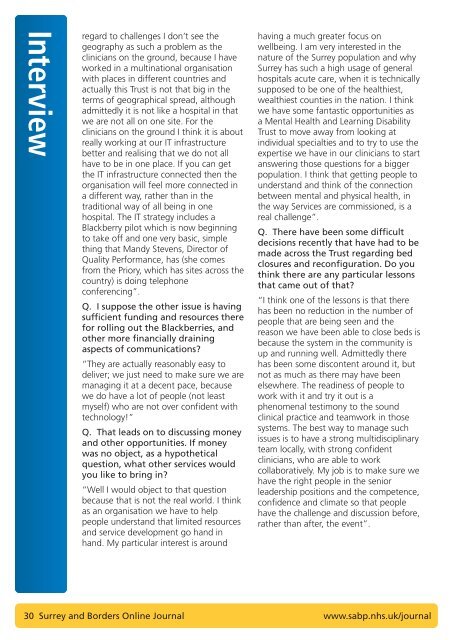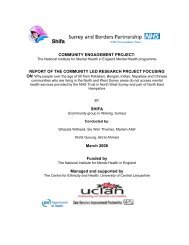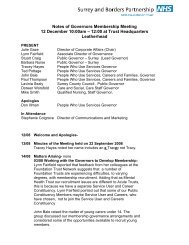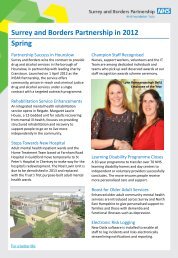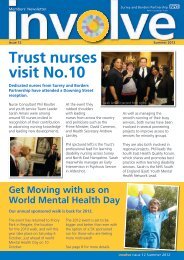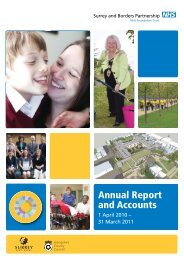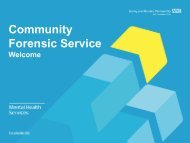Here - Surrey and Borders Partnership NHS Foundation Trust
Here - Surrey and Borders Partnership NHS Foundation Trust
Here - Surrey and Borders Partnership NHS Foundation Trust
You also want an ePaper? Increase the reach of your titles
YUMPU automatically turns print PDFs into web optimized ePapers that Google loves.
Interview<br />
regard to challenges I don’t see the<br />
geography as such a problem as the<br />
clinicians on the ground, because I have<br />
worked in a multinational organisation<br />
with places in different countries <strong>and</strong><br />
actually this <strong>Trust</strong> is not that big in the<br />
terms of geographical spread, although<br />
admittedly it is not like a hospital in that<br />
we are not all on one site. For the<br />
clinicians on the ground I think it is about<br />
really working at our IT infrastructure<br />
better <strong>and</strong> realising that we do not all<br />
have to be in one place. If you can get<br />
the IT infrastructure connected then the<br />
organisation will feel more connected in<br />
a different way, rather than in the<br />
traditional way of all being in one<br />
hospital. The IT strategy includes a<br />
Blackberry pilot which is now beginning<br />
to take off <strong>and</strong> one very basic, simple<br />
thing that M<strong>and</strong>y Stevens, Director of<br />
Quality Performance, has (she comes<br />
from the Priory, which has sites across the<br />
country) is doing telephone<br />
conferencing”.<br />
Q. I suppose the other issue is having<br />
sufficient funding <strong>and</strong> resources there<br />
for rolling out the Blackberries, <strong>and</strong><br />
other more financially draining<br />
aspects of communications?<br />
“They are actually reasonably easy to<br />
deliver; we just need to make sure we are<br />
managing it at a decent pace, because<br />
we do have a lot of people (not least<br />
myself) who are not over confident with<br />
technology!”<br />
Q. That leads on to discussing money<br />
<strong>and</strong> other opportunities. If money<br />
was no object, as a hypothetical<br />
question, what other services would<br />
you like to bring in?<br />
“Well I would object to that question<br />
because that is not the real world. I think<br />
as an organisation we have to help<br />
people underst<strong>and</strong> that limited resources<br />
<strong>and</strong> service development go h<strong>and</strong> in<br />
h<strong>and</strong>. My particular interest is around<br />
having a much greater focus on<br />
wellbeing. I am very interested in the<br />
nature of the <strong>Surrey</strong> population <strong>and</strong> why<br />
<strong>Surrey</strong> has such a high usage of general<br />
hospitals acute care, when it is technically<br />
supposed to be one of the healthiest,<br />
wealthiest counties in the nation. I think<br />
we have some fantastic opportunities as<br />
a Mental Health <strong>and</strong> Learning Disability<br />
<strong>Trust</strong> to move away from looking at<br />
individual specialties <strong>and</strong> to try to use the<br />
expertise we have in our clinicians to start<br />
answering those questions for a bigger<br />
population. I think that getting people to<br />
underst<strong>and</strong> <strong>and</strong> think of the connection<br />
between mental <strong>and</strong> physical health, in<br />
the way Services are commissioned, is a<br />
real challenge”.<br />
Q. There have been some difficult<br />
decisions recently that have had to be<br />
made across the <strong>Trust</strong> regarding bed<br />
closures <strong>and</strong> reconfiguration. Do you<br />
think there are any particular lessons<br />
that came out of that?<br />
“I think one of the lessons is that there<br />
has been no reduction in the number of<br />
people that are being seen <strong>and</strong> the<br />
reason we have been able to close beds is<br />
because the system in the community is<br />
up <strong>and</strong> running well. Admittedly there<br />
has been some discontent around it, but<br />
not as much as there may have been<br />
elsewhere. The readiness of people to<br />
work with it <strong>and</strong> try it out is a<br />
phenomenal testimony to the sound<br />
clinical practice <strong>and</strong> teamwork in those<br />
systems. The best way to manage such<br />
issues is to have a strong multidisciplinary<br />
team locally, with strong confident<br />
clinicians, who are able to work<br />
collaboratively. My job is to make sure we<br />
have the right people in the senior<br />
leadership positions <strong>and</strong> the competence,<br />
confidence <strong>and</strong> climate so that people<br />
have the challenge <strong>and</strong> discussion before,<br />
rather than after, the event”.<br />
30 <strong>Surrey</strong> <strong>and</strong> <strong>Borders</strong> Online Journal www.sabp.nhs.uk/journal


